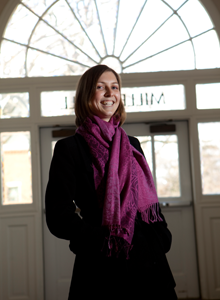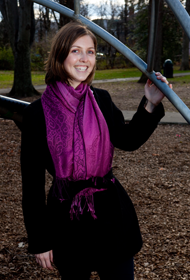Angela Schörgendorfer
PhD Student
by Rebekah Tilley
photos by Mark Cornelison
Any person involved in academic research knows there is no way to avoid the field of statistics. Somewhere along the way you have to have a working knowledge of it. Statistics touches everything.
It was this very aspect of the field that captivated Angela Schörgendorfer, now a fourth year doctoral student in the UK Department of Statistics. “I’m a math person. I like doing math that I know will be applied to something. That was what intrigued me about statistics. You can use it for medical research, any kind of social science, and just about anything.”

Schörgendorfer experienced the wide-ranging application of the field as a statistical consultant to the UK College of Agriculture where she worked on over 100 projects during a two-year period. The projects included everything from the content of horse manure to the behavior of bedbugs.
Schörgendorfer is Austrian, but this isn’t her first experience in the Bluegrass State. She first came to Kentucky as an exchange student in 1999 where she attended Lewis County High School.
“Lewis County is very rural,” said Schörgendorfer, smiling wryly. “You can imagine it was a bit of a culture shock coming from Vienna.”
Determined to be open-minded about her cross-cultural experience, Schörgendorfer rode the school bus and even started dating a local boy.
“Sometimes I felt like I was almost in a movie because I thought, ‘Ok, I’m going to come to America and find out if all the clichés and all the things you see in the movies are true.’ And they were true! You expect to get there and find out that real America is different, but that’s how it is,” Schörgendorfer said. “People at home could not believe that I was actually riding to school in a yellow school bus.”
Schörgendorfer returned to Austria to complete high school and earn a master’s degree in computer science from the Vienna University of Technology. Afterwards she applied to the UK Department of Statistics doctoral program, in part to be closer to the same boy she started dating six years before at Lewis County High School.
“After six years, we decided it was time to consolidate to one continent, and he was in structural engineering at UK,” Schörgendorfer acknowledged.
Schörgendorfer also consolidated her knowledge. “These days statistics is very computationally intensive,” Schörgendorfer explained. “A lot is based on computer simulations, so having a computer science degree is helpful in that sense. The thesis work that I’m doing is a lot of programming and running a lot of simulation.”
There is a notion that with math there is always one right answer and one way of achieving it. Math is very clean – very black and white.
That may be somewhat true in an ideal world where everyone and everything follows a perfect bell curve of behavior. However, this is rarely the case.
In her dissertation on Bayesian non-parametric statistics, Schörgendorfer is working to develop statistical models that account for these real life data abnormalities.
“A lot of times you assume that a set of data is normally distributed to make the methods work. In real life most data isn’t normally distributed. This is where non-parametric statistics comes in because it doesn’t really matter if it’s a normal or non-normal distribution,” Schörgendorfer said.
“If data is structured a certain way that doesn’t have answers yet or perhaps doesn’t have the optimal answer yet – you can try and approach it, but there is more in the data set than you can get out with the current methods. So you try to come up with a new mathematical way to get information out of the data.”

Schörgendorfer’s interest in how things work has led her to participate in a number of different service activities on campus. She is currently the President of the Graduate Student Congress, a student organization that represents graduate student concerns to the UK Graduate School and the University as a whole.
“I’m a person who likes to understand how things work,” Schörgendorfer said. “The only way to understand how the University works is to be inside and be on committees and see how decisions are made. I feel that students – especially grad students – need to be more involved. Because as grad students it’s easy to just do your research in your own little world, but there are things that affect us and we need to make our voice heard.”
